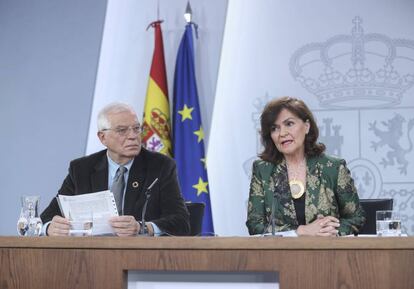Spain launches unit to fight disinformation ahead of elections
Group includes experts from National Security Department and seeks to identify cyberterrorism threats

With four elections coming up in April and May, the Spanish government has set up a special unit to fight “hybrid threats” including cyberattacks and disinformation campaigns.
Experts from the National Security Department, the Office of the State Secretary for Communication, and several Spanish ministries are leading the effort.
We are asking high-level companies to work on detection programs, but it is not easy
Source at La Moncloa
The initiative is inspired by the European Union’s own drive against disinformation ahead of the European parliament elections of May 26. In December, the European Commission announced more funds and prevention measures, including a rapid-alert system to help member states recognize and deal with disinformation campaigns.
Spain is holding local, regional and European elections on May 26 and a general election on April 28, and authorities are aware that this will provide fertile ground for manipulation attempts.
While the scope of the challenge is vast, there have been inter-ministerial meetings in recent weeks in a bid to at least identify the threats. Officials in charge of internal, defense, presidential and foreign affairs have met to discuss the issue, said sources at La Moncloa, the seat of government.
A congressional report talks about citizens’ “critical sense” as the best tool to deal with the digital world
The fact that the National Security Department is involved in the effort underscores how the government views disinformation as a national threat. European authorities have already asked for proof that the computer systems to be used in the elections have been protected against outside threats. Madrid has explained to Brussels that the vote count is done by hand (even if the data is collected in a computer system) and that companies delivering election-related services must first be certified by the National Encryption Center, which specializes in computer security.
Still, cyberattacks remain one of the main risks that Spain faces, according to the most recent national strategy against organized crime drafted by the Interior Ministry.
And dealing with disinformation will be even more complex. “We are just getting started,” said one source at La Moncloa who is familiar with this matter. “For now there are no computer tools that can guarantee the detection of fake news. We are asking high-level companies to work on detection programs, but it is not easy.”
Searching the web
A reduced group of people working under the guidance of La Moncloa has begun searching the internet to identify falsehoods and distorted facts. Each ministry involved in the effort has been given a similar task, and told to communicate any findings for urgent analysis.
For now there is no fixed protocol on how to proceed. “There’s an analysis on a case-by-case basis. Occasionally it might be best not to say anything, to prevent a snowball effect. In other cases we might choose to issue a press release or to contact the traditional media, which has a very important role to play in all this,” said sources consulted on the matter.
Spanish society is concerned about disinformation, polls show. Eight out of every 10 Spaniards view it as a problem for democracy in general and for Spain in particular, according to the latest Eurobarometer survey released last week.
The EU’s unit against disinformation, created in 2015 and focusing mostly on campaigns coming from Russia, has already debunked 5,014 falsehoods, 1,166 in the last year alone, according to the database available on Euvsdisinfo.eu.
A small share of those cases – around 10 in the last 18 months – concern the conflict in Catalonia. One of the hoaxes picked up by the EU’s disinformation service claimed that the Balearic Islands want to secede from Spain, a claim that was disseminated in 2017 by Sputnik, a Russian media outlet that receives public funding. It is difficult to estimate the impact of these messages.
Authorities are concerned about social media, because they provide an easy channel for falsehoods. But their biggest concern is the instant messaging service WhatsApp. “Spain is one of the countries where people use this app the most. Besides the fact that messages are encrypted, the problem is that the message gets sent by a personal contact or a group that you belong to, which lends it greater credibility than information that is distributed through other channels,” said sources at La Moncloa, the seat of the Spanish government.
The Spanish parliament is also showing concern. The mixed committee on national security in Congress recently concluded a report in which it asks the government to address “from a legislative viewpoint” issues such as “online crime, cyberterrorism and threats against economic or political stability.” The report talks about citizens’ “critical sense” as the best tool to deal with the digital world.
English version by Susana Urra.
Tu suscripción se está usando en otro dispositivo
¿Quieres añadir otro usuario a tu suscripción?
Si continúas leyendo en este dispositivo, no se podrá leer en el otro.
FlechaTu suscripción se está usando en otro dispositivo y solo puedes acceder a EL PAÍS desde un dispositivo a la vez.
Si quieres compartir tu cuenta, cambia tu suscripción a la modalidad Premium, así podrás añadir otro usuario. Cada uno accederá con su propia cuenta de email, lo que os permitirá personalizar vuestra experiencia en EL PAÍS.
¿Tienes una suscripción de empresa? Accede aquí para contratar más cuentas.
En el caso de no saber quién está usando tu cuenta, te recomendamos cambiar tu contraseña aquí.
Si decides continuar compartiendo tu cuenta, este mensaje se mostrará en tu dispositivo y en el de la otra persona que está usando tu cuenta de forma indefinida, afectando a tu experiencia de lectura. Puedes consultar aquí los términos y condiciones de la suscripción digital.









































